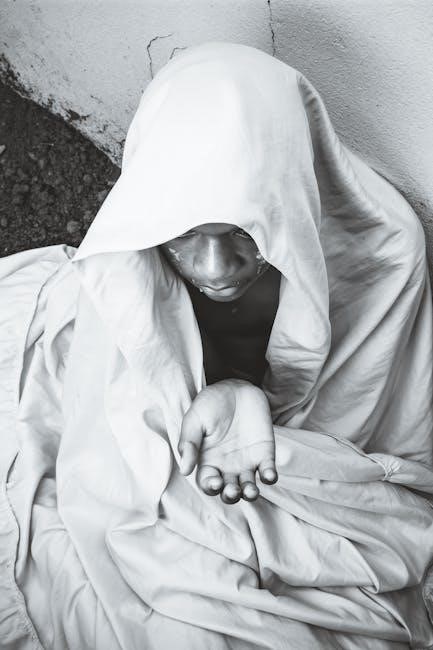Vulnerability, often misunderstood as weakness, is actually a powerful catalyst for courage, connection, and transformation. Embracing it fosters authenticity, resilience, and meaningful relationships, reshaping how we live and lead.
Understanding the Concept of Vulnerability
Vulnerability is often misunderstood as a form of weakness, but it is, in fact, the courage to be open and imperfect in the face of uncertainty. It involves embracing emotional exposure, taking risks, and being willing to be impacted by outcomes. At its core, vulnerability is about showing up authentically, even when there are no guarantees of success or safety. Brené Brown, a leading researcher on the topic, explains that vulnerability is not about winning or achieving perfection but about being brave enough to be oneself. It is a fundamental aspect of human connection, fostering empathy, trust, and deeper relationships. By understanding vulnerability as a strength, individuals can begin to break free from societal expectations of invulnerability and embrace a more wholehearted way of living.
The Importance of Vulnerability in Modern Society
Vulnerability plays a crucial role in fostering connection, empathy, and trust in modern society. It allows individuals to break down walls of pretense and engage authentically with others, fostering deeper relationships. In a culture often dominated by perfectionism and scarcity, vulnerability counters the notion that success requires invulnerability. By embracing vulnerability, people can overcome fear, shame, and disconnection, which are prevalent in today’s society. Brené Brown highlights that vulnerability is not a weakness but a source of courage and creativity. It encourages innovation, collaboration, and resilience, all of which are essential for personal and societal growth. Without vulnerability, individuals risk isolating themselves and missing out on meaningful experiences. Thus, its importance lies in its ability to transform lives and create a more compassionate and connected world.

Breaking Down the Myths Surrounding Vulnerability

Vulnerability is often misunderstood as a sign of weakness, but it is, in fact, an act of courage and honesty that fosters connection and resilience.
Vulnerability as a Sign of Weakness: A Cultural Misconception
Society often perceives vulnerability as a sign of weakness, discouraging individuals from expressing emotions or doubts. This misconception stems from cultural norms that equate strength with control and perfection.
However, Brené Brown challenges this belief, arguing that vulnerability is not weakness but courage. It requires embracing uncertainty and risking emotional exposure, which fosters deeper connections and resilience. By rejecting this myth, we can reclaim vulnerability as a powerful tool for growth and authenticity.
Redefining Vulnerability as a Source of Courage

Vulnerability is often misunderstood, but it is, in fact, a profound source of courage. Brené Brown’s research reveals that embracing vulnerability allows individuals to take risks, foster deeper connections, and live more authentically. By stepping into uncertainty and exposing our true selves, we demonstrate strength, not weakness. Vulnerability is the courage to be imperfect, to share our fears, and to pursue our passions without guarantees of success. It is the foundation of wholehearted living, enabling us to grow, innovate, and form meaningful relationships. When we redefine vulnerability as courage, we open ourselves to transformative experiences that enrich our lives and help us thrive. This shift in perspective empowers us to embrace our humanity and live with greater purpose and resilience.
Brené Brown’s Teachings on Vulnerability
Brené Brown challenges the cultural myth that vulnerability is weakness, instead linking it to courage, connection, and resilience. Her research and TED Talks inspire embracing authenticity and wholehearted living.
The Role of Shame and Its Impact on Human Connection
Shame, often fueled by fear of rejection and disconnection, acts as a powerful barrier to human relationships. It causes individuals to hide their true selves, fearing vulnerability will lead to judgment or abandonment. Brené Brown’s research reveals that shame thrives in secrecy and silence, perpetuating feelings of inadequacy and isolation. When people experience shame, they often resort to self-protective mechanisms like perfectionism, disconnection, or addiction to avoid vulnerability. This not only stifles authentic connection but also prevents individuals from embracing their true selves. Brown emphasizes that understanding and addressing shame is crucial for fostering meaningful relationships and living wholeheartedly. By acknowledging shame and practicing vulnerability, individuals can break free from its grip and cultivate deeper, more authentic connections with others.
10 Practices to Embrace Vulnerability and Live Wholeheartedly
Brené Brown outlines 10 transformative practices to embrace vulnerability and live wholeheartedly. These include cultivating self-compassion, practicing gratitude, and engaging in congruent living. She emphasizes the importance of acknowledging shame and redefining it as a catalyst for connection. Brown also highlights the need to embrace imperfection and let go of the need for control. Additionally, she encourages individuals to practice healthy venting of emotions and to trust their intuition. These practices foster resilience, authenticity, and a deeper sense of purpose. By incorporating these habits into daily life, individuals can overcome fear and scarcity, embracing vulnerability as a source of strength. These practices empower people to live more courageously, fostering meaningful relationships and personal growth. Ultimately, they guide individuals toward a life of wholeheartedness and fulfillment.
Overcoming Scarcity and Embracing Authenticity
Scarcity culture fosters feelings of “never enough,” driving disconnection. Embracing authenticity allows us to move beyond fear and inadequacy, living with courage, purpose, and fulfillment.
Scarcity Culture and Its Effects on Society
Scarcity culture, rooted in societal trauma like war and economic hardship, fosters a mindset of “never enough,” driving disconnection and fear. It emerged prominently after 9/11, as people sought to prove their worth through constant exceptionality. This culture perpetuates anxiety, disconnection, and overworking, fueling perfectionism and the pursuit of external validation. By valuing productivity over well-being, it erodes resilience and fosters shame, leaving individuals isolated and unfulfilled.
Living Authentically in a World of “Never Enough”
Living authentically in a world dominated by scarcity culture requires embracing vulnerability and rejecting the “never enough” mindset. Brené Brown emphasizes that true fulfillment arises when we let go of societal expectations and instead align with our values and intuition. Self-compassion becomes a powerful tool to counteract perfectionism, allowing us to accept ourselves as we are. By prioritizing meaningful work and creativity, we reconnect with our purpose and foster resilience. Embracing authenticity means daring to be imperfect and vulnerable, even in the face of fear and uncertainty. This shift enables us to cultivate deeper connections, experience joy, and live wholeheartedly, moving beyond the constraints of a culture that perpetuates disconnection and fear. Authentic living is not about achieving perfection but about embracing our true selves.

Building Resilience Through Vulnerability
Resilience emerges when we embrace vulnerability, allowing us to recover from stress and trauma. Practices like congruent living, spirituality, and healthy venting foster strength, enabling us to thrive amidst challenges.
Understanding Perfectionism and Its Link to Shame
Perfectionism is a pervasive issue that often stems from deep-seated feelings of shame. It manifests as an overwhelming need to be flawless, driving individuals to set unrealistic standards. This mindset can lead to self-criticism and an inability to accept imperfection, fostering a cycle of negativity. Shame, often rooted in past experiences, fuels perfectionism by creating a fear of judgment or rejection. Brené Brown’s research highlights how perfectionism acts as a shield, preventing genuine connection and vulnerability. By understanding this link, individuals can begin to dismantle perfectionistic tendencies, embracing self-compassion and authenticity. Recognizing perfectionism as a coping mechanism for shame is the first step toward healing and living wholeheartedly.
Self-Compassion as the Antidote to Perfectionism
Self-compassion emerges as a powerful antidote to perfectionism, offering a pathway to healing and self-acceptance. It involves treating oneself with kindness, understanding, and patience, especially during difficult times. Brené Brown emphasizes that self-compassion is not self-pity but rather recognizing shared humanity and acknowledging that imperfection is inevitable. By embracing self-compassion, individuals can break free from the suffocating grip of perfectionism, which often stems from shame and fear of judgment. This practice allows for emotional resilience, fostering a mindset where mistakes are viewed as opportunities for growth rather than failures. Cultivating self-compassion enables individuals to embrace their authenticity, leading to more fulfilling relationships and a wholehearted life. It’s about accepting imperfection and replacing self-criticism with gentle understanding, thereby dismantling the perfectionistic barriers that hinder true connection and vulnerability.
Foreboding Joy and the Power of Gratitude
Foreboding joy, a concept explored by Brené Brown, refers to the anxiety that arises when things are going well, often due to the fear that something negative may occur. This mindset can rob individuals of the ability to fully embrace and enjoy positive experiences. To combat this, Brown emphasizes the power of gratitude as a transformative practice. Gratitude involves actively acknowledging and appreciating the good in life, which helps shift focus from fear to joy. By cultivating gratitude, individuals can counteract foreboding joy and savor moments of happiness. This practice fosters resilience and wholehearted living, allowing people to embrace vulnerability and connect more deeply with others. Gratitude, when consistently practiced, becomes a powerful tool for fostering joy and reducing the grip of anxiety over positive experiences.

Cultivating Wholehearted Living
Wholehearted living involves embracing vulnerability, authenticity, and courage to foster meaningful connections and a fulfilling life. It requires letting go of perfectionism and nurturing practices like mindfulness and gratitude.
The Importance of Play and Rest in Wholeheartedness
Play and rest are essential components of wholehearted living, fostering joy, creativity, and resilience. In a culture that often equates busyness with worth, embracing these practices requires courage and vulnerability. Play allows individuals to disengage from productivity-driven mindsets, reconnecting with their authentic selves and finding joy in the present moment. Similarly, rest is vital for replenishing energy and maintaining emotional and physical well-being. Chronic sleep deprivation and overwork can lead to serious health issues, emphasizing the need to prioritize rest as an act of self-care. By incorporating play and rest into daily life, individuals can cultivate a sense of balance and fulfillment, embodying the principles of wholeheartedness. These practices not only enhance personal well-being but also foster deeper connections and a more meaningful engagement with life.
Embracing Creativity and Overcoming Shame
Creativity is a powerful expression of vulnerability, serving as both an emotional outlet and a source of innovation. However, many people abandon creative pursuits due to shame, often rooted in childhood experiences where their efforts were criticized or dismissed. Brené Brown emphasizes that creativity requires courage and vulnerability, making it a common trigger for shame. To overcome this, individuals must embrace their creative instincts and view them as a form of bravery rather than imperfection. By letting go of the need for perfection and allowing themselves to express freely, people can reconnect with their authentic selves. Creativity fosters connection, joy, and authenticity, essential for wholehearted living. Engaging in creative activities, whether writing, art, or music, helps individuals reclaim theirvoices and find fulfillment in self-expression.
Engaging in Meaningful Work and Embracing Purpose
Meaningful work is a cornerstone of a fulfilling life, providing purpose and identity beyond material success. Brené Brown highlights that meaningful work is not limited to one’s career; it can be found in passions, hobbies, or community involvement. Many individuals struggle to pursue their interests due to societal pressures or fear of judgment, leading to disengagement and dissatisfaction. Embracing vulnerability allows individuals to break free from these constraints, aligning their actions with their values and passions. By letting go of expectations tied to financial gain or external validation, people can find purpose in activities that bring joy and contribute to the greater good. Meaningful work fosters a sense of belonging, creativity, and fulfillment, enabling individuals to live wholeheartedly and connect with others on a deeper level, creating a lasting impact in their communities and personal lives.

Embracing vulnerability is a transformative journey that unlocks courage, connection, and fulfillment. Brené Brown’s teachings remind us that vulnerability is not a weakness but a powerful force that fosters authenticity and resilience. By letting go of shame, perfectionism, and societal expectations, we can live wholeheartedly, embracing our true selves and forming meaningful relationships. The practices outlined in The Power of Vulnerability offer a roadmap to cultivate gratitude, self-compassion, and joy, even in uncertain times. Ultimately, vulnerability is the bridge to a life of purpose, creativity, and connection; By daring to be vulnerable, we open ourselves to the possibility of living a life that is deeply fulfilling and truly our own.